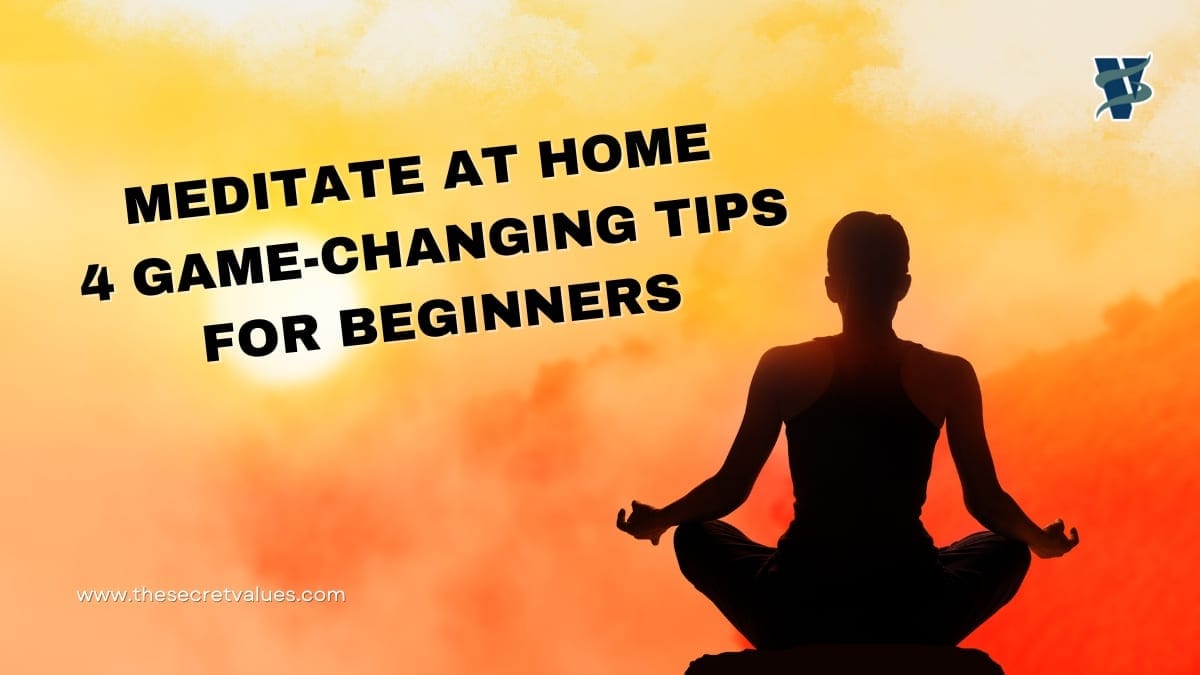Meditation has become essential for many seeking peace, clarity, and better health. If you want to meditate at home, you’re in the right place! It’s a great way to relax, build mindfulness, and take control of your mental well-being. But how do you get started? Whether you’re wondering how to meditate for beginners at home or searching for easy meditation steps, this guide will give you four game-changing tips to help you on your journey.
Benefits of Meditate at Home
There are so many benefits to practising meditation at home. Let’s discover how it could help your body and mind.
Physical Health Benefits
- Reduced stress levels: Meditation helps lower cortisol, the stress hormone.
- Better sleep quality: Regular practice can improve sleep patterns.
- Lower hypertension: Meditation has been proven to reduce hypertension.
Mental and Emotional Benefits
- Increased focus and concentration: Meditation trains your brain to stay present.
- Improved emotional resilience: It helps in handling stress and anxiety better.
- Enhanced self-awareness: Meditation allows you to connect deeply with your thoughts and feelings.
Getting Started: How to Meditate for Beginners at Home
If you’re new to meditation, it can seem overwhelming at first. Here’s how you can start with confidence.
Setting the Right Intention
Before you begin, ask yourself why you want to meditate. Having a clear intention will keep you motivated, whether for stress relief, better focus, or inner peace.
Overcoming Initial Challenges
Feeling restless or distracted? It’s completely normal. The key is to start small and be patient with yourself.
Tip 1: Create a Dedicated Meditation Space
Your surroundings affect your meditation. Setting up a peaceful space can enhance your experience.
Choosing a Quiet Spot
Choose a place at home that will be undisturbed. It can be the quiet corner of your room, that spare room in your house, or even a peaceful garden.
Essential Items for Your Space
Consider adding:
- A comfortable cushion or chair
- Scented candles or incense
- Soft lighting creates a calming ambience
Tip 2: Start with Short Sessions
Starting small is the secret to success when you meditate at home.
Benefits of Shorter Sessions
Short sessions help you build consistency without feeling overwhelmed. Even 5-10 minutes can make a difference.
How to Gradually Increase Duration
Once comfortable, you can slowly extend your practice to 15, 20, or 30 minutes.
Tip 3: Use Guided Meditations
Guided meditation is a fantastic way to ease into the practice, especially if you are unsure where to begin.
Why Guided Sessions Are Helpful
Listening to a meditation guide can help you stay focused and learn different techniques.
Best Platforms for Guided Meditation
Check out apps like Headspace, Calm, or free resources on YouTube to get started.
Tip 4: Incorporate Meditation into Your Daily Routine
Building a habit is more manageable when meditation becomes part of your daily schedule.
Morning vs. Evening Meditation
- Morning meditation can set your day up for success.
- Evening meditation aids in unwinding and improving sleep quality.
Making Meditation a Habit
Consistency is key. Set a reminder, or associate your meditating with another habit, like brushing your teeth.
Common Mistakes to Avoid When Meditating at Home
Avoid these pitfalls to make the most out of your practice:
- Expecting instant results.
- Getting discouraged by distractions.
- Being too rigid with your schedule.
Conclusion
Developing a meditation practice at home does not have to be complicated. By following these four game-changing tips—creating a meditation space, starting small, using guided sessions, and incorporating it into your daily routine—you’ll be on your way to a fulfilling meditation journey. Keep in mind that progress is more important than perfection.
FAQs
1. What is the best time to meditate at home?
The best time is when one feels pretty relaxed, though the most ideal is mornings, setting a positive day tone.
2. How long should beginners meditate?
Start with 5-10 minutes and gradually increase as you get comfortable.
3. Can I meditate lying down?
Yes, but sitting upright is usually recommended to stay alert and avoid falling asleep.
4. What should I do if I can’t focus?
Don’t worry! When your mind drifts away, gently bring it back to your breath.
5. Is it okay to listen to music while meditating?
Yes, as long as it’s calming and helps you stay focused. Nature sounds, or soft instrumental music is great choices.








1 thought on “Meditate at Home: 4 Game-Changing Tips for Beginners”